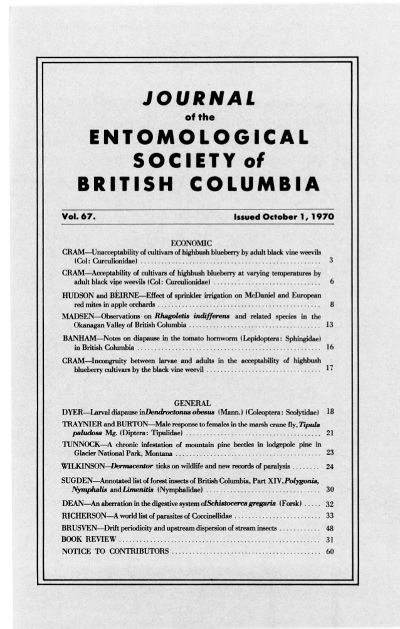Acceptability of cultivars of highbush Blueberry at varying temperatures by adult black vine weevils (Col.: Curculionidae)
Keywords:
Coleoptera, CurculionidaeAbstract
Adults of the black vine weevil,<i>Otiorhynchus (Brachyrhinus) sulcatus</i> (F.), fed and oviposited at normal, expected rates when fed excised foliage of the acceptable highbush blueberry cultivars, June and Stanley, in variable temperature regimes of 7 to 15, mean 10; 12 to 19, mean 15; and 16 to 29, mean 22C. However, on the unacceptable cultivars, Cabot and Weymouth, they laid some eggs at the high and very few eggs at the medium regimes, whereas in earlier work they laid no eggs at a constant 20C. These results indicate that Cabot and Weymouth provide barely adequate nutrition to the weevils and that environmental stresses such as a constant 20C demand more nutrients than the unacceptable cultivars can provide. Variable conditions, probably due to a lower turn-over rate during the cool periods, allow the insect to obtain the nutrients necessary for fat body development and some oviposition.References
Cram, W.T. 1965. Fecundity of the root weevils Brachyrhinus sulcatus and Sciopithes obscurus on strawberry in the laboratory and outdoors. Can. J. Plant Sci. 45:169-176.
Cram, W.T. and W.D. Pearson. 1965. Fecundity of the black vine weevil, Brachyrhinus sulcatus (F.), fed on foliage of blueberry, cranberry and weeds from peat bogs. Proc. Entomol. Soc. Brit. Columbia 62:25-27.
Cram, W.T. 1970. Unacceptability of cultivars of highbush blueberry by adult black vine weevils (Col.: Curculionidae). J. Entomol. Soc. Brit. Columbia 67:3-6.
Gordon, H.T. 1961. Nutritional factors in insect resistance to chemicals. Ann. Rev. Entomol. 6:27-54.
Downloads
Published
Issue
Section
License
Authors who publish with the Journal of the Entomological Society of British Columbia agree to the following terms:
-Authors retain copyright and grant the journal right of first publication with the work simultaneously licensed under a Creative Commons Attribution License that allows others to share the work with an acknowledgement of the work's authorship and initial publication in this journal.
-Authors are able to enter into separate, additional contractual arrangements for the non-exclusive distribution of the journal's published version of the work (e.g., post it to an institutional repository or publish it in a book), with an acknowledgement of its initial publication in this journal.
-Authors are permitted and encouraged to post their work online (e.g., in institutional repositories or on their website) prior to and during the submission process, as it can lead to productive exchanges, as well as earlier and greater citation of published work (See The Effect of Open Access).


